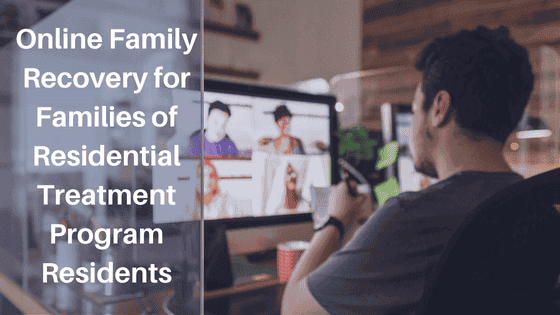
Online Family Recovery for Families of Residential Treatment Program Residents
Since the COVID-19 pandemic, behavioral health services online have become a new normal of consumer expectation: clients want effective treatment in-person and online. To offer effective behavioral health services online, clinicians stay mindful of nonverbal and verbal communication, remain flexible, and adjust curriculum and process as needed.
When patients are admitted to residential care facilities for mental health or addiction issues, it is often expected that family members are part of the recovery team. Most family members do the best they can, and they often need guidance and structure to help them navigate recovery from their loved one’s illness and manage the stress and fears that come up as their loved ones approach discharge. Sierra Tucson Addiction Treatment Center is a leader in recovery from behavioral and mental illness and addiction and is committed to offering support to families of loved ones who are in treatment.
Family Wellness Week is an important aspect of treatment at Sierra Tucson. Initially, we thought a full family program that consists of a weekly family webinar meeting online and a program week at Sierra Tucson was sufficient. Weekly, family therapists help families navigate situations that can impair patients’ recovery, addressing family systems and dynamics, boundaries, speaking and listening skills, and troubleshooting. The format is online, didactic, with two group leaders. At Sierra Tucson (on the ground), families engage in lectures, multifamily process and skills groups, experiential therapy (art therapy, equine therapy, challenge courses), and other opportunities that are part of the Sierra Tucson campus offerings. We deliver research-based information about losses during pre-treatment illness, strategies for acceptance and management of behavioral and mental health illnesses, and strategies for resilience and coping ahead.
We received very positive feedback regarding the effectiveness of our offerings. Using Feedback Informed Treatment protocol, we continue to shape our program so that family members get what they need from the Family Wellness program. We received feedback that a need was not being met: some family members could not travel to Tucson for the 3-Day Family Wellness Week, and they did not want to miss the opportunity to learn the material offered. We resolved that situation by adding a 3-Day Wellness Week online. The curriculum is similar, but the program was tailored to accommodate a 6-hour virtual program (two hours per day over three days). We increased the number of role-plays between the co-leaders, created more examples of dilemmas and resolution strategies, and provided the participants with opportunities to interact via chat. The virtual option was immediately successful. Families provided strong approval ratings and have provided feedback that they are getting their needs met online.
The Sierra Tucson Family Wellness program now consists of three components:
(a) Once per week, a 90-minute Family Wellness Weekly provides an ongoing support program for families and friends to help families effectively use skills in challenging situations as they come up,
(b) One time per month, an online 3-Day Family Wellness Week is a comprehensive experience of information and skills to aid in recovery and
(c) each week, a 3-Day Family Wellness Week is offered at Sierra Tucson (on the ground) to provide comprehensive experience of information, skills, and experiential opportunities for families and loved ones to generalize learning.
A unique aspect of this online offering is maintaining confidentiality. In a residential treatment center, privacy is of the highest concern. Confidentiality to the group is requested, but extra steps are needed so patient rights are not violated. We orient all participants not to use their real names when they log on to the session, to keep their cameras off and their microphones muted, and to communicate with us solely via chat. We ask that they not use their loved one’s name or description in any of their chat communication. Participants are encouraged to use the reaction and chat features to participate in the session. We provide multiple opportunities to ask questions, make comments, or evaluate the session, and those comments and questions are integrated into the presentation. Families report feeling heard, understood, and respected and that the format meets their needs.
The Family Wellness Program at Sierra Tucson has been successful. When families are involved and have the necessary skills, family systems are healthier, and healthy family systems increase the likelihood of sustained long-term recovery.
**********
We welcome guest columnists Vicki L. Loyer, PhD, LMFT, Holley Anderson, MS/P, Ashley Clark, MS, and Valerie Kading, DNP, MBA, MSN, PMHNP-BC.
Dr. Loyer is the instructor for TCI courses on family therapy, including The Art of Family (Tele)Therapy and Supervising Family Therapists
About Dr. Vicki Loyer, PhD:
Vicki Loyer (Carlson), Ph.D., LMFT, is the CEO/President of Blue Door Psychotherapy, a center for individual and family therapy services and family therapy training. She is a clinical assistant professor at the University of Arizona Department of Psychiatry and a Subject Matter Expert, Site Supervisor, and Instructor for Graduate Studies at Grand Canyon University. Using a competency-focused family therapy approach to working with individuals and families, she provides equine-assisted psychotherapy as an experiential therapy for greater depth. Most recently, as a result of Covid-19 restrictions, Dr. Loyer has expanded her practice and teaching in the area of delivering quality Telemental Health and has been a co-organizer of Webinars on Telemental Health Ethics and Effective Therapy. Dr. Loyer is a regular contributing author to the House Calls section of the Tucson magazine Desert Leaf, has co-author of books on premarital relationships and youth-at-risk, and has been publishing and speaking in the areas of self-injury, mental illness, addiction, and family therapy for many years. Dr Loyer is an AAMFT Clinical Member, Approved Supervisor, and a past president of the Arizona Association for Marriage & Family Therapy (AzAMFT).
Testimonials
Bridgette Nalumu
Public health consultant, Green and Purple Consultancy Network
Lora Verley
Clinical Therapist, Bayless Integrated Healthcare
Jackie Tanna
Therapist, Region One Mental Health
Jackie Bell-Russell
Therapeutic Behavioral Strategist, Rialto Unified School District